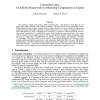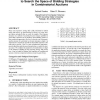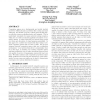65 search results - page 12 / 13 » The Complexity of Nash Equilibria in Infinite Multiplayer Ga... |
COCO
2008
Springer
13 years 7 months ago
2008
Springer
We introduce a simple game family, called Constraint Logic, where players reverse edges in a directed graph while satisfying vertex in-flow constraints. This game family can be in...
GECCO
2005
Springer
13 years 10 months ago
2005
Springer
Many non-cooperative settings that could potentially be studied using game theory are characterized by having very large strategy spaces and payoffs that are costly to compute. Be...
ATAL
2007
Springer
13 years 11 months ago
2007
Springer
Agents engaged in noncooperative interaction may seek to achieve a Nash equilibrium; this requires that agents be aware of others’ rewards. Misinformation about rewards leads to...
WINE
2009
Springer
13 years 12 months ago
2009
Springer
Congestion games are a fundamental and widely studied model for selfish allocation problems like routing and load balancing. An intrinsic property of these games is that players ...
IPTPS
2004
Springer
13 years 10 months ago
2004
Springer
In P2P systems, users often have many choices of peers from whom to download their data. Each user cares primarily about its own response time, which depends on how many other use...



